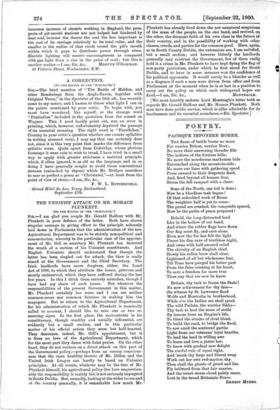THE UNIONIST ATTACK ON MR. HORACE PLUNKETT.
[TO TEX EDITOR OP THE "SPECTATOR."]
am glad you couple Mr. Gerald Balfour with Mr. Plunkett in your defence of the latter. Both have shown singular- courage in giving effect to the principle solemnly laid down; in Parliament that the administration of the new Agricultural Department was to be strictly non-political and non-sectarian, whereby in the particular case of the appoint- ment of Mr. Gill as secretary Mr. Plunkett has incurred the wrath of a section of his Unionist constituents. And English Unionists should understand that though the latter has been singled out for attack, the blow is really aimed at the Government and the Chief Secretary. The Irish landlords have never forgiven, either, the Land Act of 1896, to which they attribute the losses, grievous and mostly undeserved, which they have suffered during the last few years. In this I think them entirely mistaken, though I have had my share of such losses. But whatever the responsibilities of the present Government in this matter, Mr. Plunkett certainly has none, and I can see neither common-sense nor common fairness in making him the scapegoat. But to return to the Agricultural Department, for his administration of which Mr. Plunkett is nominally called to account, I should like to note one or two re- assuring signs. In the first place, the malcontents in his constituency, though wealthy and socially influential, are evidently but a small section, and in this particular matter of his official action they seem but half-hearted. They denounce, indeed, Mr. Gill's appointment, but it is from no love of the Agricultural Department, which for the most part they damn with faint praise. On the other hand, they do not venture on a direct attack on this part of the Government policy,—perhaps from an uneasy conscious- ness that the open hostility thereto of Mr. Dillon and the United Irish League can hardly be based on Unionist principles. At all events, whatever may be the fate of Mr. Plunkett himself, his agricultural policy (for here unquestion- ably the responsibility is mainly his) is not seriously impugned in South Dublin. But, secondly, looking at the wider issues and at the country generally, it is remarkable how much Mr. Plunkett has already lived down the not unnatural suspicions of the mass of the people, on the one hand, and revived, on the other, the dormant faith of his own class in the future of their country, and in the possibility of working with other classes, creeds, and parties for the common good. Here, again, as in South County Dublin, the extremists axe, I am satisfied, but a small section ; and however bitterly the landlords generally may mistrust the Government, few of them really hold it a crime in Mr. Plunkett to have kept flying the flag of non-party patriotism, under which he first stood for South Dublin, ana to have in some measure won the confidence of his political opponents. It would surely be a blunder as well as a disgrace if such a man were driven from office and from Parliament at the moment when he is at last in a position to carry out the policy on which such widespread hopes are [We most heartily endorse Lord Monteagle's letter both as regards Mr. Gerald Balfour and Mr. Horace Plunkett. Both men have done public service, which is alike admirable for its fearlessness and its essential soundness.—En. Spectator.] -






































 Previous page
Previous page